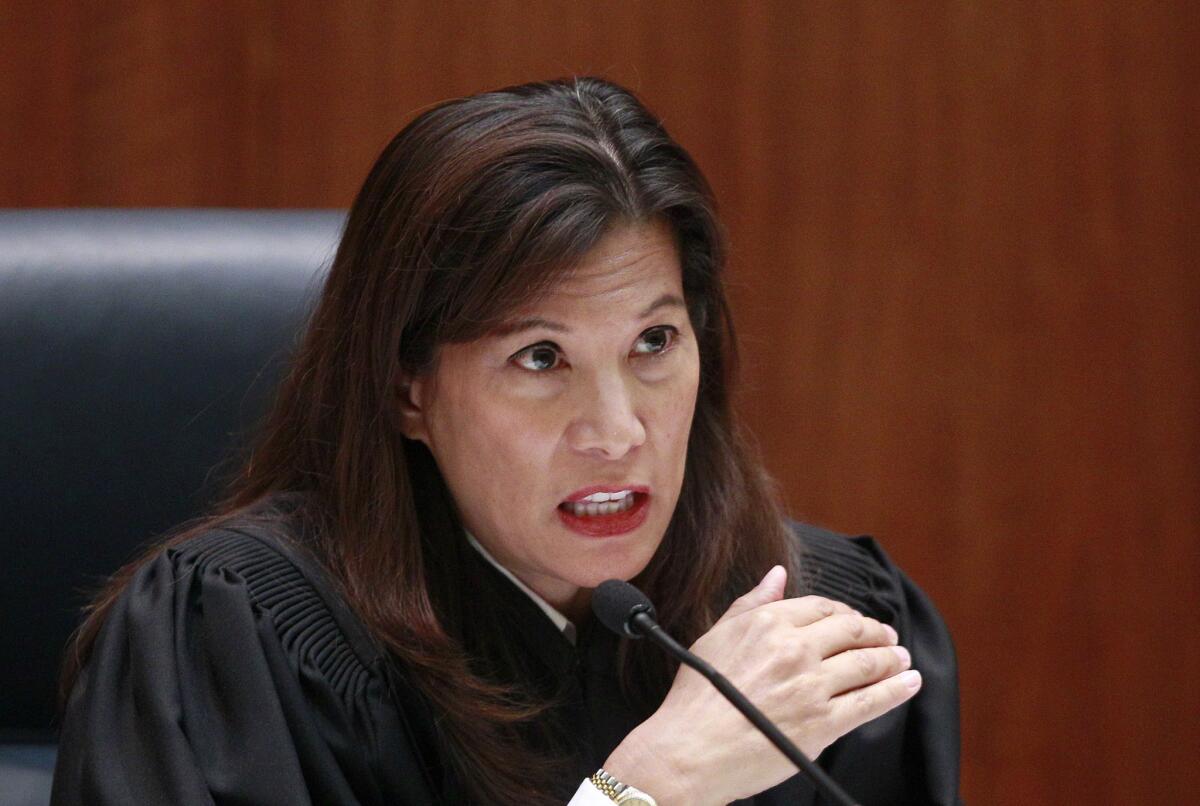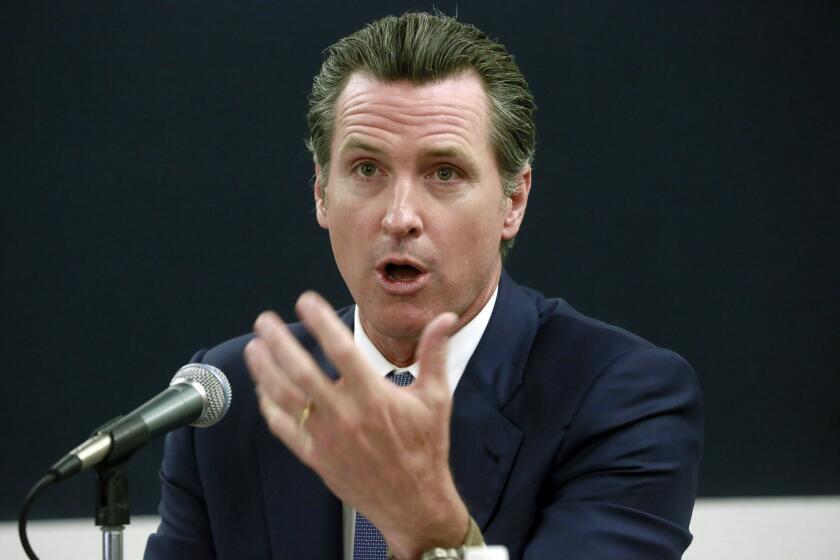As coronavirus roils courts, prosecutors and public defenders fume about state directives

- Share via
Prosecutors and public defenders vented their anger Monday with a decision by California’s judicial leaders to extend some legal deadlines and recommend that hearings be held remotely.
The state’s Judicial Council, which makes policy and sets rules for the courts, voted unanimously Saturday to extend the deadlines for pre-trial criminal matters and recommended they be conducted remotely by telephone or video if possible, during the coronavirus crisis.
Public defenders, who have been trying to get clients out of jail, were furious about the extension of deadlines. Prosecutors were upset that judicial leaders merely recommended remote hearings rather than ordering them.
Oscar Bobrow, president of the California Public Defenders Assn., called the situation in California’s jails a “time bomb.”
He said the deadline extensions were forcing inmates who have not been convicted to live in close quarters in jails that are become a breeding ground for the coronavirus.
“People are fighting over toilet paper in the aisles of Safeway,” Bobrow said. “Things could turn crazy quickly. And if you are held in custody on that kind of offense, your life could be in jeopardy.”
An inmate in the Los Angeles County jail has tested positive for COVID-19 as well as four employees. Four inmates in the Orange County jail also have tested positive.
In Solano County, where Bobrow is chief deputy public defender, defense lawyers have been going to court, he said. Prosecutors have been participating remotely.
Bobrow called on Chief Justice Tani Cantil-Sakauye, head of the Judicial Council, to order sheriffs to release more inmates, including those with low-level crimes and those who are close to completing their sentences.
Some sheriffs have done this, while others have not. Bobrow said he believed Cantil-Sakauye had the powers to do so under a sweeping order Gov. Gavin Newsom issued last week. The unprecedented order gave her temporary power to suspend laws.
Coronavirus: Newsom gives chief justice broad powers during crisis
Orange County Dist. Atty. Todd Spitzer, on the other hand, called on Cantil-Sakauye to issue a statewide order requiring preliminary hearings be held remotely.
He said the council’s emergency meeting Saturday just created confusion.
“I was so angry,” he said.
He complained that Orange County Public Defender Sharon Petrosino was insisting that clients appear in person for preliminary hearings, where prosecutors must show there is sufficient evidence to believe a crime has been committed.
“There is no doubt we are going to litigate this,” he said.
He suggested that public defenders were simply trying to get charges dismissed by refusing to waive their clients’ rights to appear. Prosecutors can refile charges only once after dismissal for most felonies and twice for the most serious felonies.
Judicial leaders who recommended remote hearings said that not all courts were equipped to handle them.
Cathal Conneely, speaking for the Judicial Council, said the courts were doing their best during this state of emergency to balance health and safety concerns with litigants’ civil and constitutional rights.
Orange County’s Petrosino complained that Spitzer has been fighting her office’s attempts to get the vulnerable and those accused of low-level level crimes out of jail.
One of them was a former combat Marine who had been a prisoner of war and suffered from post-traumatic stress. He was recently arrested on suspicion of violating probation in 2010 but had committed no later crime.
Her office was trying to get him out of jail when he died. He was 69. She said it wasn’t yet known whether he contracted the coronavirus.
“Practically everybody who was arrested since the 17th of March is in custody and has not yet seen a judge,” she said.
In response, Spitzer said the 69-year old former marine died of pre-existing conditions and the DA’s office did not oppose the inmate’s release. Because he had already been sentenced, prosecutors did not even have the authority to weigh in on the case, Spitzer said.
Normally, someone who is arrested is entitled to go before a judge within 48 hours for an arraignment, where the charges are explained and the person can enter a plea. The Judicial Council extended the time to seven days.
Inmates are supposed to be given to a preliminary hearing within 10 court days after arraignment. Judicial leaders have extended that time to 30 court days
Petrosino said her office has agreed to remote arraignments, but her clients have a constitutional right to appear for their preliminary hearings. Courtrooms are big enough for social distancing, she said, and it is important that the accused see the witnesses against them and be able to confer with their lawyers.
``”If we are the ones giving up on our clients’ constitutional rights, then who do they have left?” she said.
Times staff writer Richard Winton contributed to this report.
More to Read
Sign up for Essential California
The most important California stories and recommendations in your inbox every morning.
You may occasionally receive promotional content from the Los Angeles Times.











